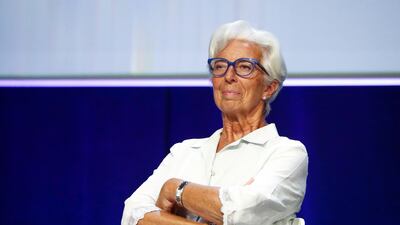The European Central Bank said on Thursday it will trim the pace of its asset purchases over the coming quarter as the bank takes a tentative step towards unwinding emergency economic aid that supported the economic zone during the pandemic.
The ECB said it would buy bonds under its €1.85 trillion Pandemic Emergency Purchase Programme (Pepp) at a pace moderately lower than the €80 billion ($94.6bn) a month it bought over the previous two quarters.
“Based on a joint assessment of financing conditions and the inflation outlook, the Governing Council judges that favourable financing conditions can be maintained with a moderately lower pace of net asset purchases under the Pepp than in the previous two quarters,” the central bank said on Thursday.
But the regulator said that it would continue to buy bonds “flexibly, according to market conditions”, as it looks to prevent a tightening of financing conditions that is inconsistent with its inflation target of 2 per cent.
“In addition, the flexibility of purchases over time, across asset classes and among jurisdictions will continue to support the smooth transmission of monetary policy” the ECB said.
“If favourable financing conditions can be maintained with asset purchase flows that do not exhaust the envelope over the net purchase horizon of the Pepp, the envelope need not be used in full.”
ECB president Christine Lagarde said the eurozone was on track for strong growth in the third quarter with economic activity at its pre-pandemic level by the end of the year.
She expects gross domestic product to expand by 5 per cent this year, above the 4.6 per cent seen in June, while growth next year is seen at 4.6 per cent, largely unchanged from the ECB's previous 4.7 per cent projection.
The European Central Bank's decision to slow the pace of its pandemic-emergency bond purchases does not equate to "tapering", Ms Lagarde said, referring to a term used to describe the gradual withdrawal of stimulus measures.
"What we are doing is recalibrating" the programme in response to favourable economic conditions, she said.
Andrew Kenningham, chief Europe economist at Capital Economics, said while today’s policy statement confirms that the ECB will reduce the pace of its asset purchases slightly, the move is a long way from being a “full taper”.
"Total asset purchases will probably continue at an average monthly rate of around €90bn per month in the coming quarter, there is still no firm end-date for the emergency purchase programme," he said.
The emergency scheme, the ECB's primary tool since the onset of the pandemic, is still on track to be wound down next March at the earliest, with no further indication from the ECB on when and how it would recalibrate policy to accommodate the end of the support programme.
The European lender has provided record support since the start of the pandemic in the spring of last year but with growth and inflation rebounding, policymakers have come under pressure in recent weeks to formally acknowledge that the worst of the crisis is over.
The ECB did not signal any further withdrawal of support and maintained its long-standing guidance that it will boost support further if it becomes necessary.
"The Governing Council stands ready to adjust all of its instruments, as appropriate, to ensure that inflation stabilises at its 2 per cent target over the medium term," the ECB said.
The council said that bond purchases under its Asset Purchase Programme will remain at €20bn a month and its interest rate, now at a record-low of minus 0.5 per cent, will remain at its current or lower level until it sees inflation hitting its 2 per cent target.
Consumer prices in the eurozone are expected to rise by 2.2 per cent in 2021, but the jump in inflation is expected to be only temporary, Ms Lagarde said.
"In the medium term, inflation is foreseen to remain well below our two percent target," she said, as the European Central Bank also raised its inflation outlook for 2022 to 1.7 per cent, and for 2023 to 1.5 per cent.
Earlier this month, the The Bank of England maintained its stimulus package and held interest rates at 0.1 per cent while also signalling that “modest tightening” would be needed as inflation ramps up.


